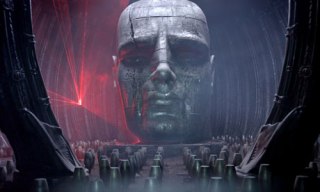Expansive, loud, and chaotic, Ridley Scott’s return to science fiction with Prometheus (2012) is not going to be for everyone. If you can look beyond the flaws, however, there may be a potential classic lurking in the shadows. Or inside your abdominal cavity. Or in a metal jar underground on an alien planet.
Essentially a prequel to Scott’s 1979 paradigm-shifting sci-fi/horror film Alien, Prometheus concerns a scientific expedition to a distant solar system where Dr. Elizabeth Shaw (Noomi Rapace) and Dr. Charlie Holloway (Logan Marshall-Green) believe there may be an alien civilisation somehow connected to our own. The expedition was funded by inventor and industrialist Peter Weyland (Guy Pearce, under heavy ageing make-up), whose name should be sounding alarm bells for fans of the series. Along for the ride are a number of supporting roles played by great British character-actors (among them Idris Elba, Rafe Spall and Kate Dickie), as well as Weyland’s representative, Meredith Vickers (Charlize Theron, ice-cold and intimidating), and the great man’s proudest creation, the android David (Michael Fassbender). Fassbender stuns as David, the aggressively-passive android, while Rapace and Theron provide opposing yet equally great performances.
Things begin in a calm and rather sedate manner. Once ‘Prometheus’ lands, however, things very quickly go pear-shaped for our intrepid explorers, with disastrous consequences. Contagions, mutations, monsters and some emergency surgery later, the future looks rather dim for the crew. All the while, David stalks primly through the ship with a set jaw and steely gaze.
Prometheus is not a film of subtlety; Scott, along with screenwriters Jon Spaihts and Damon Lindelof, packs it full of ideas – far too many for a two-hour film to satisfactorily explore them all – but they cannot resist drawing attention to too many of them, especially those which would be better served as subtext. Having said that, the film is bursting with ideas too big and varied to summarise in a spoiler-free review.
Suffice it to say, the middle third of the film is insane beyond reasonable comprehension; visceral, stomach-churning, and spectacular. The sense of uncontrollable chaos has rarely been as prevalent and as urgent in a film (even James Cameron’s Aliens and Jean-Pierre Jeunet’s Alien: Resurrection never felt quite as over-the-edge as this), and it will undoubtedly prove to be a bridge too far for some. There have already been complaints over some of the monsters which emerge to terrorise Shaw and co., but I for one bound their designs refreshingly smart in an genre which so often disappoints when it comes to creature design (I’m looking at you, J.J. Abrams).
While not every idea in Prometheus is original, it rehashes and expands many of the themes and ideas of the first four Alien films into something that feels both new and ancient, like the classic xenomorph itself. Scott’s visual nous has never been in question, but here it is unparallelled, proving that, as with Alien and Blade Runner (1982), this is the genre that best showcases his directorial eye. Prometheus is like a fever-dream of the imagination, and it may not always be successful, but its scatter-gun approach hits more than enough targets for this critic.
Read Patrick Gamble’s cinematic review here.
David Sugarman



